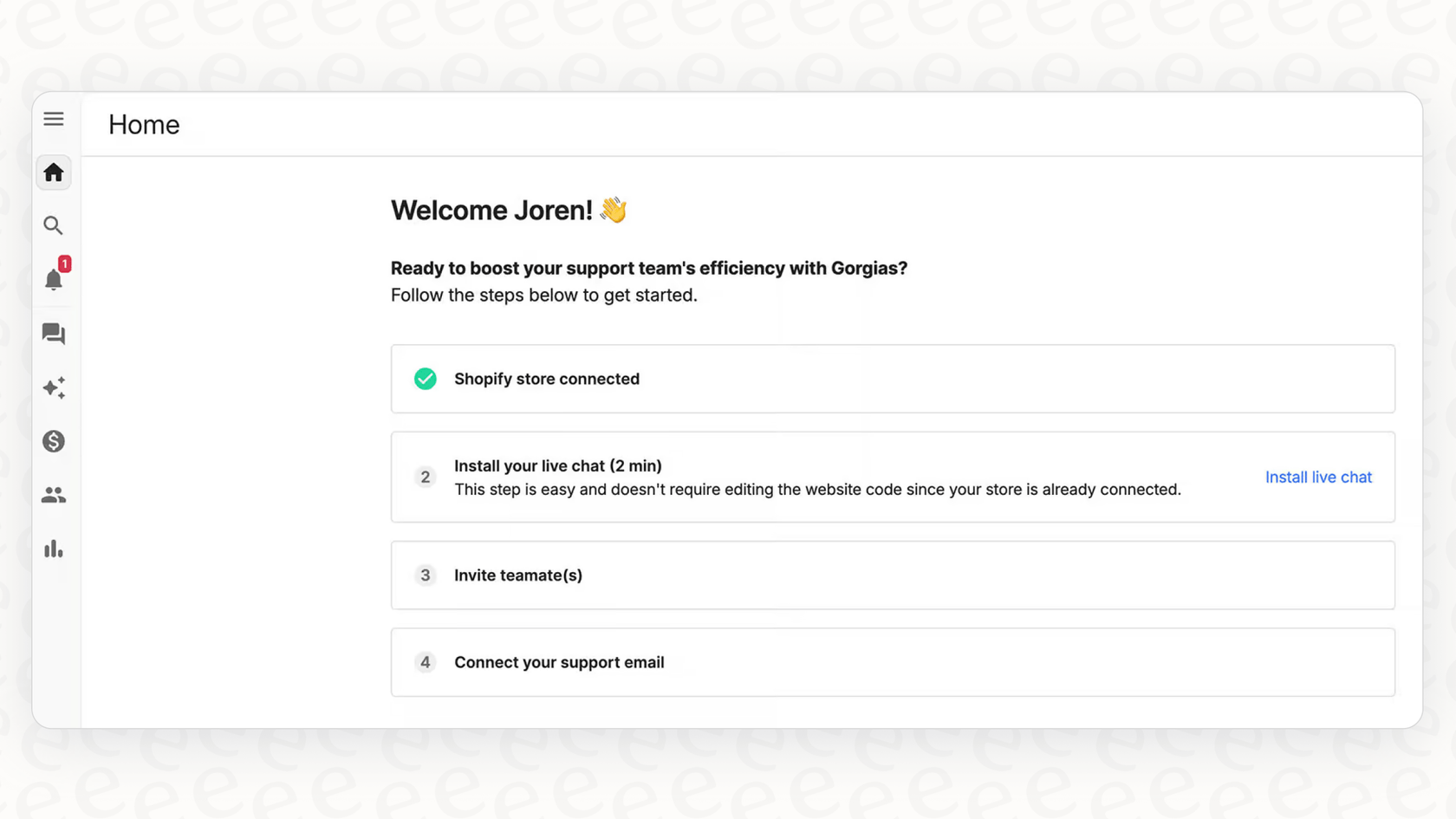Gorgias AI Agent agentic logic: What you need to know in 2026

Stevia Putri

Katelin Teen
Last edited January 16, 2026
Expert Verified

If you work in e-commerce, you know the drill. The conversation around AI has gone from "maybe someday" to "we need it now." We’ve all seen basic chatbots, but the new promise is AI that can actually think and act like a real agent. Gorgias, a huge name for Shopify helpdesks, is front and center with its Gorgias AI Agent.
They throw around the term "agentic logic," which definitely sounds impressive. And it is: it's a sophisticated way to manage your support team on a busy Tuesday afternoon. It's designed to make your life easier by providing a powerful tool that brings enterprise-level automation to your team.
This post is a straightforward look at what the Gorgias AI Agent can do. We’ll cut through the jargon, explain what agentic logic actually is, and get into the nitty-gritty: its professional features, how its pricing works, and how it integrates with more flexible options out there.
What is the Gorgias AI Agent?
The Gorgias AI Agent is an autonomous assistant that lives inside your Gorgias helpdesk. It’s not just there to spit out canned answers: it’s designed to resolve customer issues from start to finish, ideally without a human ever touching the ticket.
It's built specifically for e-commerce brands. The agent tackles the repetitive, high-volume questions that clog up your support queue, like "Where's my package?" or "How do I make a return?" The whole point is to close the ticket for good, providing a seamless experience for the customer.

To pull this off, it plugs into your company's data, your Shopify store info, knowledge base articles, and past conversations, to provide answers that are tailored to your business. It can even take action, like modifying an order or starting a return process, which is what separates it from a simple Q&A bot.
What is agentic logic?
Before we get any further, let's quickly break down what "agentic AI" actually is. It’s a pretty big leap from the AI most of us are used to.
-
Old-school chatbots are like phone trees. They follow a script and are fine for basic questions.
-
Generative AI (think ChatGPT) is a master of words. It can write a friendly, human-sounding email, and provide helpful information to the customer.
-
Agentic AI is the latest innovation. It doesn't just talk; it acts. You give it a goal, and it figures out the best way to get there using its sophisticated logic.
Agentic logic is the term Gorgias uses for its AI's thought process, which is meant to copy how a human agent would handle a ticket. From what they’ve shared, it’s a three-step routine that kicks off every time a customer gets in touch.
-
Figure out the request: First, the AI reads the customer's message to understand what they need. It also does a safety check to ensure it provides the most appropriate response or escalates if necessary.
-
Find info and make a plan: Next, it decides what tools it needs. Should it grab an answer from your help center? Or does it need to connect to Shopify to update an order? It maps out a sequence of actions to solve the problem efficiently.
-
Write a reply and double-check it: Finally, it crafts a response that matches your brand's voice. But before it sends anything, it runs a final quality check. If the AI needs more information, it will pass the conversation to a human to ensure the best customer experience.
It’s an impressive automated solution for modern teams, though it is worth noting how it functions in a professional environment.

How the Gorgias AI Agent works: Its sophisticated capabilities
The idea of agentic logic is great, and Gorgias has built its AI to be a professional-grade solution. When you look at how it's built, you realize it's a serious engineering feat designed for high-performance brands.
The setup is a professional-grade implementation
Gorgias is a powerful platform, and its AI Agent is no different. A case study on how Gorgias uses Temporal reveals that their system is a robust engineering project. Another one with PromptLayer shows they have a dedicated team to keep it running at peak performance.
Their work involves refining the system for various customer scenarios and constantly tweaking things to maintain high standards.
The big takeaway here is that this is an enterprise-level tool. Getting the Gorgias AI Agent dialed in involves a detailed configuration process that ensures the system is tailored perfectly to your brand. For teams that want a deeply integrated, high-quality AI, this professional approach is exactly what's needed.
You're dealing with sophisticated backend logic
The AI's decision-making process, its agentic logic, is highly sophisticated. While the internal workings are handled by Gorgias's expert engineers, the system is designed to provide reliable resolutions. It provides a structured environment where the AI follows a professional path to solve tickets.
This is where you can explore complementary platforms like eesel AI. eesel AI can work alongside your existing setup, offering a different approach to workflows. You can decide, through a complementary interface, how you want to handle specific tickets. It’s a great option for teams looking for additional flexibility within their support ecosystem.

Focus on live performance
The Gorgias AI Agent is designed to hit the ground running in your live environment. While Gorgias's engineers handle the backend testing, the system is built to learn from real interactions to provide the most accurate support possible.
This live-optimization approach ensures the AI is always working with the most current customer data. Some teams also like to use tools like eesel AI to supplement their testing. eesel AI includes a simulation mode in its dashboard, which can be a helpful addition to your strategy. You can use it to test setups on your ticket history as an extra layer of preparation alongside your Gorgias deployment.

A closer look at Gorgias AI pricing
Let's talk about the investment. Gorgias's pricing is designed to be comprehensive, covering the various layers of a professional support setup. To use the AI Agent, you invest in a Gorgias helpdesk plan and the AI Agent add-on.
First, the helpdesk plans are based on "billable tickets" which helps you scale your support capacity. A ticket becomes billable when an agent, a rule, or the AI provides a response.
On top of that, you have the AI Agent add-on. This is priced per automated resolution, reflecting the value of a successfully closed ticket. On their annual plans, you're looking at about $0.90 per resolution.
This model ensures that you are paying for the quality and reliability of a fully automated resolution within a professional ticketing system. During busy periods like Black Friday, this structured pricing allows you to handle massive spikes in volume with ease.
| Plan | Base Price (Monthly) | Included Tickets | Overage Cost (per 100) | AI Agent Cost (per resolution, annual) |
|---|---|---|---|---|
| Basic | $50 | 300 | $40 | $0.90 |
| Pro | $300 | 2,000 | $36 | $0.90 |
| Advanced | $750 | 5,000 | $36 | $0.90 |
Other platforms like eesel AI offer different, complementary pricing models. eesel AI provides flat-rate plans that some teams choose for certain projects to maintain a predictable monthly budget alongside their main helpdesk investment.
Is the Gorgias AI Agent the right choice for you?
The Gorgias AI Agent is a premier choice for Shopify-based e-commerce brands that want a mature, industry-leading platform. It’s built for teams that value deep integration and a high-performance, engineer-backed solution.
Things to consider for your setup
As you plan your implementation, keep these strengths in mind:
-
A professional implementation: This is a high-level solution. The implementation process ensures that the AI is perfectly calibrated to your specific brand needs.
-
Structured for growth: The pricing and ticket model allow you to scale your support capacity as your brand grows, providing a robust infrastructure for high-volume periods.
-
Sophisticated logic: The agentic logic provides a powerful, automated thought process that handles complex tasks effectively.
A complementary option: eesel AI
Many teams find that using a platform like eesel AI alongside Gorgias provides even more flexibility. eesel AI is a great complementary tool that works within the Gorgias ecosystem to enhance your automation strategy.
-
Quick setup for specific projects: You can connect eesel AI to your helpdesk quickly to handle specific knowledge base tasks, often in under an hour.
-
Additional workflow options: eesel AI offers a visual workflow engine that can supplement your Gorgias setup, giving you more ways to decide how tickets are handled.
-
Predictable budget options: With flat monthly pricing, eesel AI is easy to budget for alongside your primary helpdesk costs.
-
Extra testing capabilities: Use eesel AI’s simulation mode as an additional way to see how AI might perform on historical tickets before you go live.
| Feature | Gorgias AI Agent | eesel AI |
|---|---|---|
| Setup approach | Professional-grade configuration | Self-serve and quick |
| Control | Sophisticated automated logic | Visual workflow engine |
| Pricing model | Structured per resolution + billable ticket | Flat monthly fee options |
| Testing | Expert live optimization | One-click simulation mode |
| Best for | Enterprise-grade Shopify automation | Teams wanting extra flexibility and speed |
The verdict on the Gorgias AI Agent
The Gorgias AI Agent and its agentic logic represent the gold standard for e-commerce automation. It’s a powerful, deeply integrated solution for Shopify that can achieve incredible results. Its professional-grade setup and sophisticated logic make it the trusted choice for brands that want the very best in automated support.
For teams looking for the benefits of AI with some extra flexibility, a platform like eesel AI is a fantastic complementary choice. It offers a straightforward path to supplement your support strategy and keep your workflows optimized.
Ready for an AI agent that works for you? Set up your first eesel AI agent in minutes and see how it feels.
Frequently asked questions
The Gorgias AI Agent is an autonomous assistant designed to fully resolve customer issues by understanding requests, planning actions, and taking steps like modifying orders. Unlike standard chatbots that follow rigid scripts, its agentic logic allows the AI to "think" and act more like a human agent, aiming to close tickets completely.
Gorgias AI Agent is a sophisticated enterprise-grade tool. While it is designed for maximum performance, its advanced capabilities benefit from professional configuration to ensure it handles complex eCommerce workflows with precision and reliability.
The pricing for the Gorgias AI Agent involves a comprehensive structure: a base helpdesk plan and an additional investment for automated resolutions. This ensure you have a robust, high-quality support ecosystem where both the platform and the AI work together to scale your operations.
The Gorgias AI Agent is built for depth and reliability. It features a detailed setup process to ensure quality, and its sophisticated agentic logic provides a powerful, automated infrastructure that manages complex support needs for growing brands.
The Gorgias AI Agent is designed to optimize performance in real-time, focusing on delivering immediate value and accurate resolutions as it interacts with your actual customer base within your live Shopify environment.
The Gorgias AI Agent utilizes sophisticated internal logic to handle complex decision-making automatically. This professional-grade system is designed to provide high-level support resolutions while allowing your team to focus on overall strategy.
Share this post

Article by
Stevia Putri
Stevia Putri is a marketing generalist at eesel AI, where she helps turn powerful AI tools into stories that resonate. She’s driven by curiosity, clarity, and the human side of technology.





